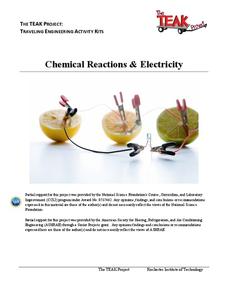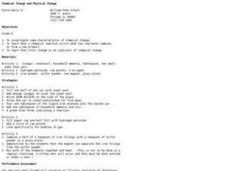American Chemical Society
Production of a Gas - Controlling a Chemical Reaction
Though the publisher designated this unit for use with third through eighth grades, this particular lesson would be best used with middle schoolers due to the specific measurement skills required. Basically, they set up the reaction...
Cornell University
Chemical Reactions
Investigate the Law of Conservation of Mass through a lab exploration. Individuals combine materials to initiate chemical reactions. They monitor for signs of reactions and measure the masses before and after the reactions for...
American Chemical Society
Temperature and the Rate of a Chemical Reaction
Putting glow sticks in the freezer makes them last longer, but why is that? Lesson focuses on how temperature impacts the rate of a chemical reaction. It begins with a teacher demonstration, then scholars design their own experiments...
Rochester Institute of Technology
Chemical Reactions and Electricity
After a discussion of chemical reactions and electricity, scholars break into groups and follow a scripted activity to discover if fruit can power a clock. After a concluding discussion, the class a presented with a challenge.
Massachusetts Institute of Technology
Lego Atoms and Molecules: Chemical Reactions
Show young chemists what a chemical reaction looks like with two parts of a hands-on experiment. First, learners conduct a wet lab where they observe the reactants (baking soda and calcium chloride, with phenolsulfonphthalein)...
American Chemical Society
Chemical Reactions and Engineering Design
Construction leads to habitat loss and local wildlife suffers. Scholars must build a reptile egg incubation device that meets many constraints. Various experiments help them discover the chemical reaction needed to reach...
Cornell University
Energy Changes in Chemical Reactions
The heat of solution measures how much thermal energy a dissolving substance consumes or gives off. The experiment demonstrates both endothermic and exothermic reactions. Scholars dissolve several substances, measure the temperature...
Curated OER
Chemistry: Chemical Reactions
Students investigate chemical reactions. In this chemistry lesson, students burn magnesium and record the mass. Students list five chemical reactions they see everyday.
American Chemical Society
A Catalyst and the Rate of Reaction
More than 90 percent of chemical products are made using a catalyst. Lesson demonstrates the way a catalyst changes the rate of reaction without altering the chemical reaction. A catalyst doesn't appear as a reactant or a product, yet it...
American Chemical Society
Controlling the Amount of Products in a Chemical Reaction
Everyone enjoys combining baking soda and water. Here is a lesson that challenges scholars to analyze the reaction three different ways — the real substances, the chemical equation, and the molecular models. Class...
Rochester Institute of Technology
Molecules and Fuel Cell Technology
A fuel cell is where the jailer keeps gas guzzlers. Scholars review chemical reactions, chemical bonds, and chemical structure in order to apply these concepts. Participants construct fuel cell kits, using electrolysis to run the car and...
Curated OER
Candy Reaction
In this triboluminescence worksheet, learners use wint-o-green Lifesavers to observe a chemical reaction that gives off light. They break a lifesaver up with a hammer and make observations and they chew a lifesaver and make observations....
Curated OER
Ziplock Chemistry
Students investigate various chemical reactions when creating mixtures in ziplock baggies. In this chemistry lesson, students will recognize various chemical reactions and cite evidence. Safety and assessment strategies are included in...
Curated OER
Chemistry in the Kitchen
Students, in groups, combine given materials from an everyday kitchen until a chemical reaction occurs and record the reaction time.
Curated OER
Light Stick Chemistry
In groups of three with the lights off and the shades drawn, investigators place inactivated light sticks, in three beakers: one filled with ice water, another with lukewarm water, and the other with room temperature water. They wait...
Curated OER
Investigating Chemical and Physical Changes
Students explore physical and chemical changes by looking at how different powders react to a variety of substances. They observe and identify the difference between physical and chemical change using a mystery powder.
Curated OER
The Nature of Chemical Change: Acting Out an Example
Learners identify the signs that a chemical reaction took place. In this chemistry instructional activity, students role play the movement of different molecules of matter. They classify matter according to their properties.
Curated OER
Chemical Change and Physical Change
Sixth graders combine chemicals to create a chemical change. In this chemicals lesson plan, 6th graders will investigate characteristics of chemical change by combining chemicals. They will learn that color change is an indicator of...
Curated OER
Activity #1 Reactions: Chemical or Physical?
Middle schoolers distinguish between physical changes and chemical changes. They comprehend that chemical reactions produce new substances with compositions and properites which are different than those of the starting materials. ...
Curated OER
Chemical Changes
Students compare types of chemical change. In this chemical reaction lesson, students use a variety of household items to investigate different types of chemical change. Students will engage in a discussion about the dangers of chemicals...
Curated OER
Chemistry in a Bag Demonstration
Students experiment in a lab and observe chemical reactions and pH changes. In this experimental lesson students participate in a lab then write their observations and fill out a worksheet.
American Chemical Society
Using Chemical Change to Identify an Unknown
If you discover an unknown powder, how do you determine if it is safe? Lesson uses four different tests to identify the properties of various powders that appear the same. Then scholars get an unknown powder and have to determine which...
Curated OER
Acids, Copper, and Zinc
Middle schoolers observe chemical reactions using post-1982 pennies. They observe the reaction of an acid with zinc but not copper under the same conditions over a two week period.
NOAA
Ocean Zones
How can organisms light up in water? Bioluminescence is light produced in a chemical reaction that can occur in an organism's body. First, learners determine what happens to light/color as you move into the deep ocean. In groups, they...























